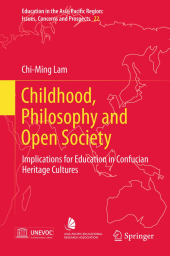 Neuerscheinungen 2015Stand: 2020-02-01 |
Schnellsuche
ISBN/Stichwort/Autor
|
Herderstraße 10
10625 Berlin
Tel.: 030 315 714 16
Fax 030 315 714 14
info@buchspektrum.de |

Chi-Ming Lam
Childhood, Philosophy and Open Society
Implications for Education in Confucian Heritage Cultures
2013. 2015. xiii, 185 S. 10 Tabellen. 235 mm
Verlag/Jahr: SPRINGER, BERLIN; SPRINGER SINGAPORE; SPRINGER 2015
ISBN: 981456088X (981456088X)
Neue ISBN: 978-9814560887 (9789814560887)
Preis und Lieferzeit: Bitte klicken
This book develops a theory and practice of education from Karl Popperīs non-justificationist philosophy for promoting an open society, taking the form of an educational program for fostering critical thinking in children, especially in group discussion.
_The purpose of this book is to develop a theory and practice of education from Karl Popperīs non-justificationist philosophy for promoting an open society. Specifically, the book is designed to develop an educational programme for fostering critical thinking in children, particularly when they are involved in group discussion.The study conducted an experiment to assess the effectiveness of Matthew Lipmanīs Philosophy for Children (P4C) programme in promoting Hong Long (Chinese) childrenīs critical thinking. Forty-two Secondary 1 students volunteered for the experiment, from whom 28 students were randomly selected and randomly assigned to two groups of 14 each: one receiving P4C lessons and the other receiving English lessons. The students who were taught P4C were found to perform better in the reasoning test than those who were not, to be capable of discussing philosophical problems in a competent way, and to have a very positive attitude towards doing philosophy in the classroom. It was also found that P4C played a major role in developing the studentsī critical thinking.Considering that the construction of children by adults as incompetent in the sense of lacking reason, maturity, or independence reinforces the traditional structure of adult authority over children in society, it runs counter to the goal of fostering critical thinking in children. As a way to return justice to childhood and to effectively promote critical thinking in children, the present study suggested reconstructing the concept of childhood, highlighting the importance of establishing a coherent public policy on promotion of agency in children and also the importance of empowering them to participate actively in research, legal, and educational institutions.
Chapter 1 - Introduction
1.1 Philosophy and Influence of Karl Popper
1.2 Aims and Significance of the Study
1.3 Argument and Outline of the Book
Chapter 2 - Theoretical and Practical Justifications for Popperīs Non-Justificationism
2.1 Introduction
2.2 The Problem of the Bounds of Reason
2.3 Solution One: Comprehensive Rationalism
2.4 Solution Two: Critical Rationalism
2.5 Solution Three: Comprehensively Critical Rationalism
2.6 From Theory to Practice
2.7 The Problem of Practicality
2.8 Conclusion
Chapter 3 - Education for Open Society as an Educational Ideal
3.1 Introduction
3.2 The Ideal of Open Society
3.3 The Role of Education in Open Society
3.4 Confucianism and Critical Rationalism
3.5 How Lipmanīs Philosophy for Children Programme Fits the Popperian Ideal
3.6 Conclusion
Chapter 4 - An Empirical Study of the Effectiveness of Lipmanīs Philosophy for Children Programme on Promoting Childrenīs Critical Thinking in Hong Kong, China
4.1 Introduction
4.2 Method
4.3 Results
4.4 Discussion
Chapter 5 - Reconceptualisation of Childhood for Promoting Justice in an Open Society
5.1 Introduction
5.2 Construction of Childhood in Philosophy, Psychology, and Sociology
5.3 Deconstruction of Childhood for Exposing Injustices Towards Children
5.4 Reconstruction of Childhood as a Way to Justice
5.5 Conclusion
Chapter 6 - Conclusions
6.1 Outcomes of the Study
6.2 Implications for Theory and Practice
6.3 Suggestions for Further Research


